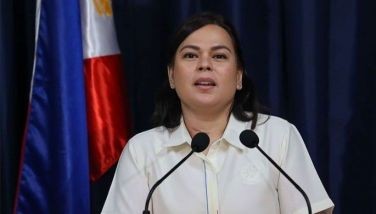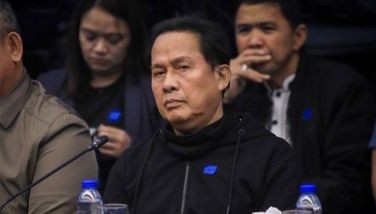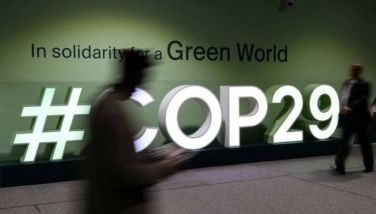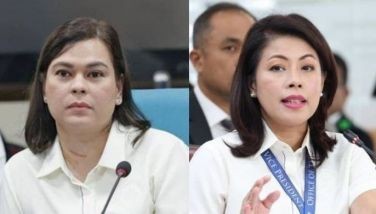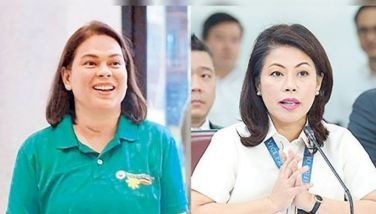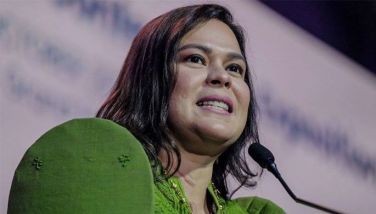DOJ eases rules for pardon, executive clemency in time of COVID-19 pandemic

MANILA, Philippines — The Department of Justice is easing application for parole and executive clemency to hasten decongestion of penal facilities in this time of COVID-19 pandemic.
Justice Secretary Menardo Guevarra approved a board resolution on the Interim Rules on Parole and Executive Clemency which is part of DOJ’s “study for the release of prisoners on humanitarian considerations,” said Justice Undersecretary Markk Perete.
The Parole and Probation Administration defined parole as conditional release of a prisoner in correctional institution after serving the minimum period of prison sentence, while an executive clemency is the commutation of sentence, conditional pardon and absolute pardon that may be granted by the president.
Under the interim rules, parole or executive clemency review of inmates who are elderly, sickly or suffering with terminal, life-threatening illnesses or with serious disability will be prioritized.
Documentary requirements for parole review and executive clemency cases are trimmed down to only include court certification of no pending case, court certification of no appeal and records check with the National Bureau of Investigation.
Board members are also directed to “take up twice the amount of their regular load in order to expedite the grant of parole and recommendation for executive clemency.”
Requirements for parole eligibility remain
Perete explained that “general requirements for eligibility of parole remain.”
Under DOJ rules, the following are eligible for parole:
- Inmate serving an indeterminate sentence the maximum period of which exceeds one year
- Inmate has served the minimum period of the indeterminate sentence
- Inmate’s conviction is final and executory
- Inmate has no pending case
- Inmate is serving sentence in the national penitentiary, unless confinement in municipal, city, district or provincial jail is justified
Other proposals to decongest penal facilities are still being vetted, Perete said.
More PDLs made eligible for executive clemency
Perete said those who are not eligible for parole “may apply for clemency if they meet the criteria set under the resolution.”
Persons Deprived of Liberty who are 65 years old and above who have served at least five years of their sentence or whose “continued imprisonment is inimical to their health” are eligible for executive clemency.
Heinous crimes, drug convicts excluded
These new guidelines, however, do not cover convicts of heinous crimes or illegal drugs-related crimes, or those classified by the Bureau of Corrections as high-risk.
The resolution however did not define who are considered “high-risk” inmates.
The resolution will be effective while the state of national emergency is in place.
The number of COVID-19 cases in the Correctional Institution for Women (CIW), under BuCor, has risen to 20.
National tally of COVID-19 meanwhile is at 6,710 infections.
Follow this page for updates on a mysterious pneumonia outbreak that has struck dozens of people in China.
New Zealand Prime Minister Chris Hipkins says on Sunday that he had contracted COVID-19, testing positive at a key point in his flailing campaign for re-election.
Hipkins saYS on his official social media feed that he would need to isolate for up to five days -- less than two weeks before his country's general election.
The leader of the centre-left Labour Party said he started to experience cold symptoms on Saturday and had cancelled most of his weekend engagements. — AFP
The World Health Organization and US health authorities say Friday they are closely monitoring a new variant of COVID-19, although the potential impact of BA.2.86 is currently unknown.
The WHO classified the new variant as one under surveillance "due to the large number (more than 30) of spike gene mutations it carries", it wrote in a bulletin about the pandemic late Thursday.
So far, the variant has only been detected in Israel, Denmark and the United States. — AFP
The World Health Organization says on Friday that the number of new COVID-19 cases reported worldwide rose by 80% in the last month, days after designating a new "variant of interest".
The WHO declared in May that Covid is no longer a global health emergency, but has warned that the virus will continue to circulate and mutate, causing occasional spikes in infections, hospitalisations and deaths.
In its weekly update, the UN agency said that nations reported nearly 1.5 million new cases from July 10 to August 6, an 80% increase compared to the previous 28 days. — AFP
The head of US intelligence says that there was no evidence that the COVID-19 virus was created in the Chinese government's Wuhan research lab.
In a declassified report, the Office of the Director of National Intelligence (ODNI) says they had no information backing recent claims that three scientists at the lab were some of the very first infected with COVID-19 and may have created the virus themselves.
Drawing on intelligence collected by various member agencies of the US intelligence community (IC), the ODNI report says some scientists at the Wuhan lab had done genetic engineering of coronaviruses similar to COVID-19. — AFP
Boris Johnson deliberately misled MPs over Covid lockdown-breaking parties in Downing Street when he was prime minister, a UK parliament committee ruled on Thursday.
The cross-party Privileges Committee said Johnson, 58, would have been suspended as an MP for 90 days for "repeated contempts (of parliament) and for seeking to undermine the parliamentary process".
But he avoided any formal sanction by his peers in the House of Commons by resigning as an MP last week.
In his resignation statement last Friday, Johnson pre-empted publication of the committee's conclusions, claiming a political stitch-up, even though the body has a majority from his own party.
He was unrepentant again on Thursday, accusing the committee of being "anti-democratic... to bring about what is intended to be the final knife-thrust in a protracted political assassination".
Calling it "beneath contempt", he said it was "for the people of this to decide who sits in parliament, not Harriet Harman", the veteran opposition Labour MP who chaired the seven-person committee. — AFP
- Latest
- Trending

















